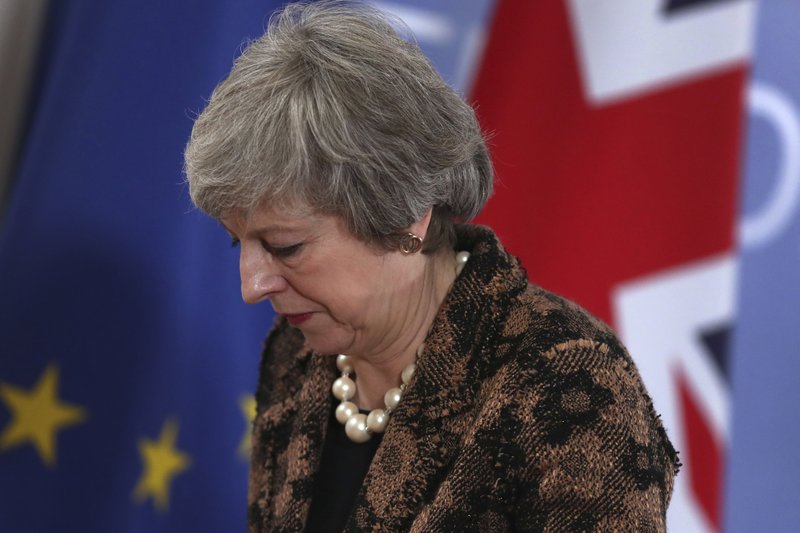
(Photo: AP)
British Prime Minister Theresa May insisted Friday that her Brexit deal was still alive and kicking, despite a stinging rebuff from the European Union after she asked for changes to make the agreement more palatable to UK lawmakers.
May came to an EU summit in Brussels seeking legally binding changes to the agreement, but the bloc told her bluntly that a renegotiation was not possible. They offered only assurances they would seek to move swiftly on forging a new trade deal after Britain leaves the bloc on March 29.
Nonetheless, May told reporters in Brussels that she welcomed the EU’s words — and that, as formal conclusions of an EU summit, they “have legal status.”
“There is work still to do, and we will be holding talks in coming days about how to obtain the further assurances that the UK Parliament needs in order to be able to approve the deal,” May said.
May’s optimism contrasted with a pessimistic tone from many on the EU side. EU leaders expressed deep doubts that May could live up to her side of their Brexit agreement and vowed to step up preparations for a potentially-catastrophic “no-deal” scenario for Britain’s departure.
“Very objectively, the signals that we heard yesterday are not especially reassuring about the capacity in Britain to be able to honor the engagement that was undertaken,” Belgian Prime Minister Charles Michel told reporters.
Expressing a “gigantic doubt” that May can get her Brexit deal through the British Parliament, Michel said: “we are going to be sure to prepare for all hypotheses, including the hypothesis of a ‘no deal.’”
May canceled a Brexit vote in the UK Parliament this week after it became clear it would strongly vote down the Brexit deal she concluded with the EU last month. She hopes to secure changes from the bloc in order to get Parliament’s approval in a vote next month.
But EU leaders rejected any attempt to re-negotiate their agreement, a 585-page legal text settling things like the divorce bill and the rights next year of Europeans living in Britain or Britons living in the EU. It also includes a document laying out their hopes for future relations, which isn’t legally binding.
In a combative late-night press conference, European Commission President Jean-Claude Juncker accused Britain of failing to give detailed proposals on Brexit, saying it was “up to the British government to tell us exactly what they want.”
May was filmed speaking sternly to Juncker as leaders arrived at Friday morning’s session of the summit. She said the pair had had a “robust” exchange.
No country has ever left the 28-nation EU — the world’s biggest trading bloc — and the rules laying out that process are sketchy.
Essentially, Brexit is being made up as the process advances. Court challenges have clarified some of the rules. This week, Europe’s top court ruled that Britain can change its mind about leaving should it want to. One thing is clear: Brexit will happen on March 29, although a transition period will help ease Britain out over almost two, and possibly up to four, years.
The prospect of a no-deal has shaken markets and the British pound, and created substantial uncertainty for investors and businesses.
Brexit involves Britain leaving around 750 international treaties drawn up over 40 years of membership. One of them is the EU’s aviation market. Without a deal, British planes won’t be able to land in Europe on March 30. Nor will European planes be able to land in the UK.
May appeared determined to press ahead with her deal, despite suffering a week of political blows, including having to postpone Parliament’s vote on the Brexit deal and facing down a no-confidence vote from her own Conservative Party. She won, but was left weakened after more than a third of her lawmakers rebelled.
Should May manage, against the odds, to persuade Parliament to adopt the agreement in January, EU leaders could convene again for a special Brexit summit next month.
Luxembourg Prime Minister Xavier Bettel appealed to British MPs to keep the interests of their citizens in mind.
“For internal political reasons, some people try to gamble on the relations between the EU and the UK for the future. It’s bad. This is the best possible deal,” Bettel said. “They should think about the interests of their voters and people in their country.”
In Britain, Cabinet Office Minister David Lidington, a senior May ally, insisted Thursday’s talks in Brussels had been “a welcome first step,” noting that the EU had said it wanted a “speedy UK trade deal” after Brexit.
But opponents of the government said the EU summit showed that May’s deal would never get the support of the British Parliament.
Scottish First Minister Nicola Sturgeon tweeted that May “has tried, credit to her for that, but, as expected, the EU is not open to renegotiation. It’s time to stop this pretense, bring the vote to Parliament and then, when the deal is rejected, seek to bring majority behind a second EU vote. Anything else now is just wasting time.”


